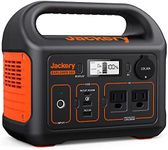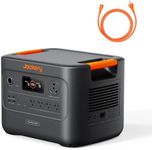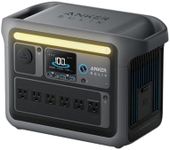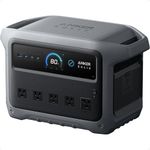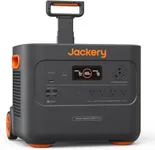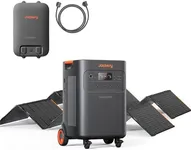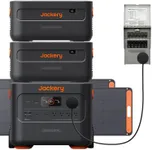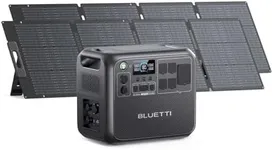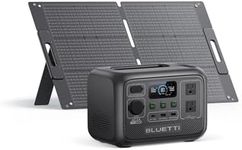Buying Guide for the Best Portable Power Stations
When selecting a portable power station, it's important to focus on how you plan to use it. Whether you're camping, preparing for emergencies, or just looking to power devices on the go, the right unit will match your intended needs in terms of power, size, and convenience. Think about the types of devices you'll be powering, how much energy they require, and how long you'll need to keep them running. Remember, there are trade-offs between portability and capacity, so knowing your priorities will help guide your choice.Battery Capacity (Wh or mAh)Battery capacity tells you how much energy the power station can store, usually measured in watt-hours (Wh) or milliamp-hours (mAh). This is important because it directly impacts how long and how many devices you can charge before the station itself needs recharging. Lower capacity units (under 300 Wh) are sufficient for charging phones, laptops, and small gadgets for a day trip, while medium ones (300-700 Wh) can keep medium appliances or multiple devices running for a weekend. Larger capacities (above 700 Wh) are well-suited for power-hungry devices or longer use, like running small refrigerators, power tools, or as home backup. To pick the right size, add up the power needs of your devices and estimate how long you'll be without a wall outlet.
Output Ports and TypesThe types and number of output ports on a power station dictate what devices you can connect and charge. Common outputs include standard AC outlets, USB-A and USB-C ports, and DC (car-style) ports. It's important because the right mix ensures compatibility with your devices. If you mainly charge phones and laptops, several USB ports may be enough, but if you want to run small appliances, you'll need one or more AC outlets. For specialized equipment, like CPAP machines or camping gear, check for compatible DC ports. List what you need to charge and make sure the unit has the right ports in sufficient quantity.
Recharge Options and SpeedHow you recharge the power station itself—such as via wall outlet, car charger, or solar panel—affects its flexibility and how quickly it’ll be usable again. Quicker charging is useful for short turnaround times, while solar charging is essential for off-grid use. Look at the charging methods supported and how long each takes. For occasional use at home, standard wall charging might be sufficient, but for off-grid camping or emergencies, prioritize models that can charge quickly from solar panels or vehicles.
Portability (Weight and Size)Portability refers to the physical size and weight of the power station, which determines how easy it is to move. This is important if you plan to carry it over distances, pack it in a car, or have limited storage. Lightweight, compact units (generally under 10 lbs) are ideal for backpacks and light travel, while heavier units (over 20 lbs) may require wheeled transport but offer more capacity. Choose lighter, smaller models if you prioritize mobility, and larger ones if you're less concerned about moving it frequently.
Power Output (Wattage)Power output refers to the maximum amount of electricity the power station can deliver at one time, measured in watts (W). This impacts what size and type of devices you can run simultaneously. For charging phones and laptops, lower outputs (below 300W) are fine. For small appliances or multiple devices, you'll want medium outputs (300-700W). To run high-powered devices like kettles or fridges, you'll need outputs above 700W. Check the wattage ratings of your devices and be sure the power station can match or exceed them.
Durability and Safety FeaturesDurability and safety features ensure the power station withstands wear and tear, and keeps your devices and you safe. Features might include rugged casing, protection against overcharging, short-circuiting, or overheating. This is especially important for outdoor use or in environments where the station might be bumped or exposed to dust and moisture. If you plan outdoor or heavy-duty use, look for models with strong build quality and multiple safety protocols, while for light, occasional use, basic protections may suffice.
Display and ControlsA good display and intuitive controls help you monitor the power station’s status, such as battery level, input/output wattage, and error warnings. This is important for managing energy use and troubleshooting. If you want hands-off simplicity, basic displays and controls are fine; if you prefer close monitoring and optimization, seek models with clear, detailed screens and easy navigation.



